Review: Professor Marston and the Wonder Women a Breathless Depiction of How An Icon Was Born of Deep Love
4.5 out of 5 stars.
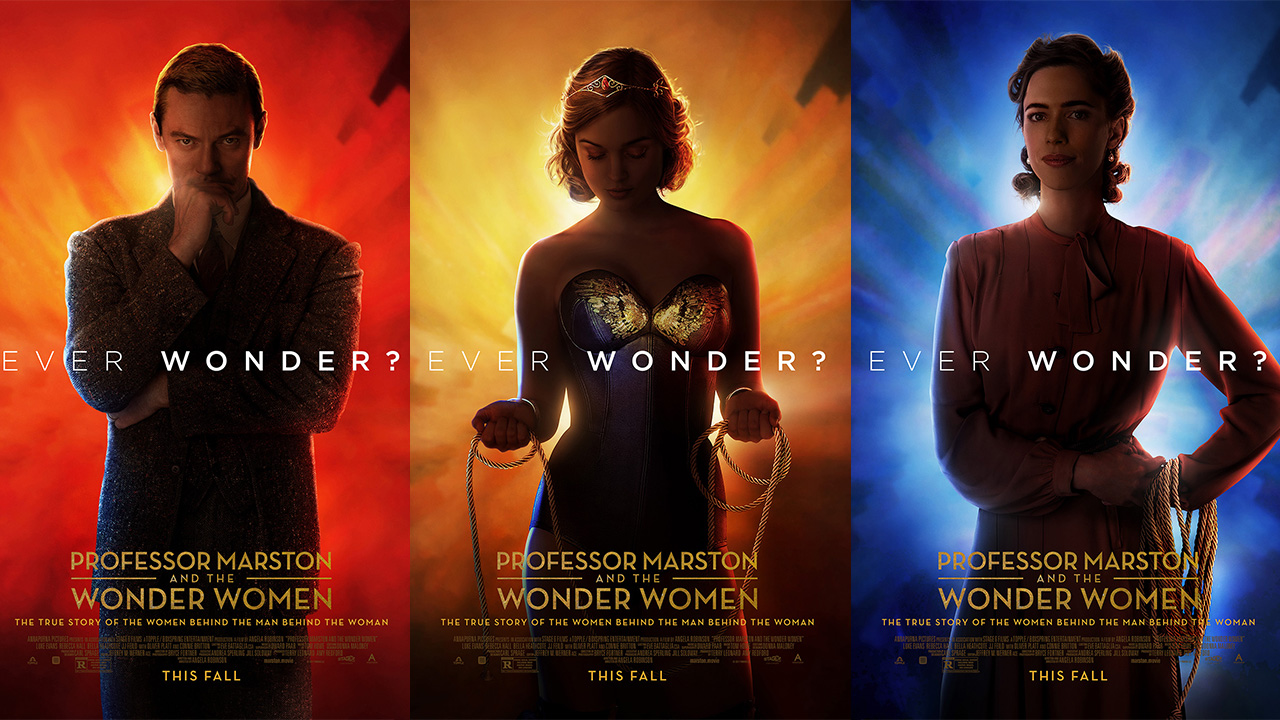
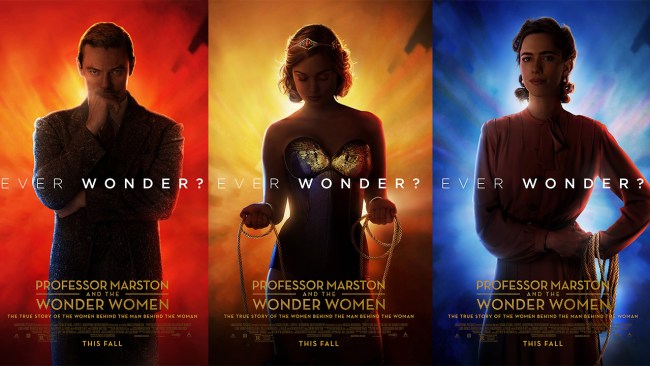
Diana of Themyscira is all about love, strength, and hope. It makes sense, then, that the person—nay, the people—responsible for her existence had a relationship that required more than the usual amount of strength and hope to survive, and that the love of three people was needed to create this one, iconic superheroine. Professor Marston and the Wonder Women gives us a beautiful and fascinating look at that relationship.
Dr. William Moulton Marston, the creator of Wonder Woman, was a professor of psychology and an inventor, working with his wife, Elizabeth, in creating an early version of the lie detector. He also developed DISC Theory, illustrating that people demonstrate their emotions through one of four behavior types: Dominance, Inducement, Submission, and Compliance.
Written and directed by Angela Robinson, Professor Marston uses the DISC behavior types as a structure to tell the story of how Bill (Luke Evans) and his wife Elizabeth (Rebecca Hall), met a young student named Olive Byrne (Bella Heathcote) who changed their lives forever. When Olive becomes Bill’s research assistant, there is sexual tension immediately, and Elizabeth is torn by both the feeling that something happening between them should be wrong and intellectually understanding that she wants to be Bill’s “wife, not [his] jailer.”
To complicate things further, Olive is engaged to another man. However, as she starts to spend more and more time with the brilliant couple, she begins to feel not only tension with Bill, but an intense pull toward Elizabeth. Eventually, the pull is just too much, and she’s drawn to the couple permanently.
And so, in 1930s-40s America, these three people attempt to navigate a hugely unconventional relationship. There’s great love between them, but also great struggle, as Bill is fired from his professorship due to rumors about the relationship, leaving Elizabeth to be the primary breadwinner. Both women have children with Bill, and Olive becomes the stay-at-home mom as Elizabeth works as a secretary, and Bill pursues his writing career. And, of course, to anyone who asks, Olive is a widowed friend staying with the Marstons along with her children.
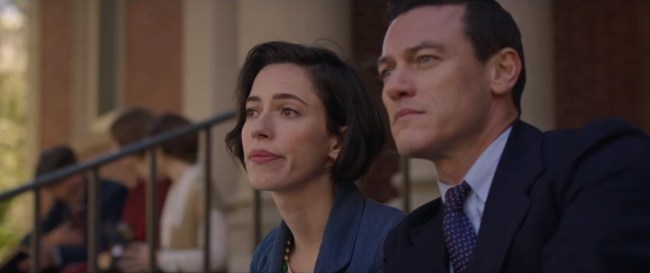
As they navigate the ins-and-outs of maintaining an ever-growing, but basically standard household, they are also exploring their sexuality. Bill’s DISC theory might evoke images of the dominance and submission of BDSM and kink for you, and not without reason. In the film, both Bill and Elizabeth discover that they are are extremely turned on by things like bondage and spanking.
In one particularly visceral scene early in the film, Olive invites the couple to be observers at her sorority’s “baby party,” where new, potential sisters dress up like babies, are paired with older sorority sisters, and hazing includes putting a “baby” over a sister’s knee to be spanked with a paddle. (Apparently, these things totally happened.)
Embarrassed, Olive ends up having to spank a “baby” who’s transgressed, knowing that Bill and Elizabeth are watching from the shadows. But as she begins to spank, she realizes that not only is Bill obviously into what he’s watching, but Elizabeth is, too. Suddenly, Olive’s spanking becomes more intense as she begins to derive power from it, knowing that these two people she’s falling in love with are enjoying watching her do it.
The lynchpin of Professor Marston is the relationship between Olive and Elizabeth. While it’s clear that Olive loves Bill (she wouldn’t have so much sex with him, live with him, or bear his children if she didn’t), the focus of the film is the love between the women, and it is so refreshing—and so true to the spirit of these early feminists—that the film has this perspective, despite it ostensibly being about “the Creator of Wonder Woman.”
As Bill says in the film, after extolling the many strengths of each woman, “together, you are the perfect woman.” Wonder Woman then became his not-very-subtle homage to the women he loved, their life together, and the feminist, progressive ideals they shared. Bill wanted to spread those ideals to the youth and change the world. Oh yeah, and early Wonder Woman contained a bunch of bondage imagery, because DISC theory.
That bondage imagery is the catalyst for another framing device used in the film: scenes where Bill is being interrogated by Josette Frank (Connie Britton), a psychologist who thought Bill and Wonder Woman to be anti-feminist and dangerous. This provides a really interesting counterpoint to the sections where Bill is lecturing on DISC theory. As we watch the Marstons’ story unfold through each of the four behavior types, we have Josette Frank’s suspicious, judgmental questions reminding us that while the Marstons have joy and love in the bubble of their home, there’s a real world out there ready to tear them apart. The world almost succeeds.
With writer/director Robinson’s hand to guide it, Professor Marston would’ve already been a perfectly solid, well-crafted, and entertaining biopic. What makes the film extraordinary, though, is not only the representation it provides (a female-led story, LGBTQIA+ representation, representation for people in non-monogamous relationships, or who are into kinky sex), but the respect with which Robinson treats these people and the way in which they chose to live their lives.
What’s truly groundbreaking about this film isn’t the sex scenes, but how normal and almost boring the Marstons’ lives are. Robinson never sensationalizes any aspect of their relationship. When they have sex, it’s sweet and loving. It’s passionate (no really, there are some really hot scenes up in here), but grounded. It’s real. The rest of the time, they’re dealing with the kids, arguing, laughing over meals, paying bills together—the way it would happen in any family. If it were any other family, you wouldn’t bat an eyelash, and what this film seems to assert is, These people are just like you.
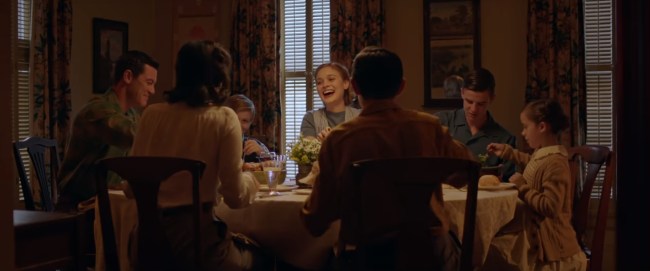
Robinson’s script and direction are bolstered by her impeccable actors. Each of the film’s three leads are perfectly cast in their roles.
Evan’s Bill Marston strikes the perfect balance between masculine confidence and entitlement, and the ability to step back and give women the floor. Problematic though many of Martson’s ideas were, the Bill of this film reminds us just how ahead of his time he was with regard to gender dynamics and the things of which women were capable. To quote The King and I, “This is a man who stumbles and falls, but this is a man who tries.” Evans captures the struggle between Marston’s genuine feminism and the ingrained sexism of his time beautifully.
Bella Heathcote is a revelation as Olive Byrne. She delivers a fierce intelligence alongside a hopefulness and openness that is the furthest thing from naive. She’s also sweet, and charming as hell. It’s easy to see why either Marston would be totally in love with her.
But I have to say that Rebecca Hall holds this whole thing down as Elizabeth. In many ways, Hall has the trickiest role to play. Much like the delicate balancing act that women have to strike in real life, Hall in her performance as Elizabeth had to be practical without being a nag, dominant without being impenetrable. In lesser hands, Elizabeth could’ve easily become a caricature. Instead, there is a beautiful vulnerability pulsing through everything she does. Even at Elizabeth’s most sarcastic, clinical, or cynical, she is warm and loving and cares for these two people more than anyone or anything in the world.
The three of them together are magic, and the chemistry between them is off-the-charts.
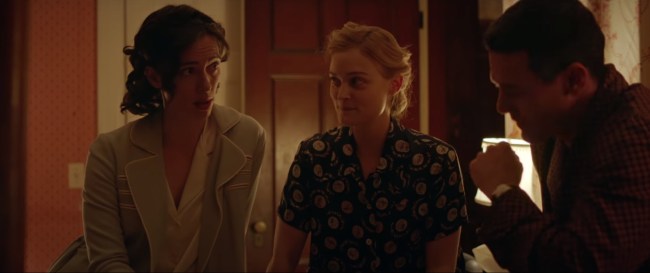
I’m grateful this movie exists. After the screening I attended, I told anyone who would listen that this film is representative of all the facets of my inner life in a way that very few films have ever been. The only way it could’ve been more representative is if Robinson would’ve made Olive Latina. But seriously, it’s rare that LGBTQIA+ people, people in non-monogamous relationships, and women get treated with this much care in film. The fact that it also included some awesome comic book history was icing on the cake.
From now on, when I meet someone new, I’m gonna be like, “Go watch Professor Marston and the Wonder Women, and then you’ll understand me.”
Whether you’re in it for the Wonder Woman history, the representation, or simply an intriguing true story told well, Professor Marston and the Wonder Women is worth your time and your hard-earned bucks. It’s the kind of movie that grabs hold of your soul and your brain and won’t let go, feeding your thoughts and conversations long after you’ve left the theater.
Professor Marston and the Wonder Women premieres at the Toronto International Film Festival on September 12th, and opens in the U.S. October 13th.
(image: Annapurna Pictures)
Want more stories like this? Become a subscriber and support the site!
—The Mary Sue has a strict comment policy that forbids, but is not limited to, personal insults toward anyone, hate speech, and trolling.—
Have a tip we should know? [email protected]